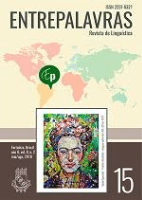
Entrepalavras
Scope & Guideline
Empowering Voices in Linguistics and Education
Introduction
Aims and Scopes
- Discourse Analysis:
The journal focuses on the analysis of discourse across various contexts, including political discourse, media communication, and everyday interactions. This includes examining how language shapes social realities and identities. - Multimodality:
Entrepalavras emphasizes the study of multimodal texts, which involves understanding how various modes of communication (text, visuals, gestures) work together to create meaning. This includes analyses of advertisements, digital media, and educational materials. - Linguistic Variation and Lexicography:
The journal explores the nuances of linguistic variation, including dialectal studies and the impact of sociocultural factors on language use. It also addresses lexicographic practices and the development of dictionaries as educational tools. - Language and Technology:
The integration of technology in language learning and communication is a key focus. This includes studies on digital communication, online education, and the role of social media in shaping language practices. - Cultural Representation:
Entrepalavras investigates how language reflects and constructs cultural identities and representations, particularly through media, literature, and music. This includes analyses of gender, race, and socio-political themes.
Trending and Emerging
- Digital Discourse and Social Media:
There is a growing focus on how digital platforms and social media influence language use and communication practices. This includes analyses of memes, hashtags, and online interactions that shape contemporary discourse. - Cultural and Political Discourse:
Studies examining the interplay between language, culture, and politics have gained prominence. This includes analyses of political speeches, media representations, and cultural narratives that reflect social issues. - Inclusivity and Diversity in Language:
Emerging research emphasizes the importance of inclusivity and representation in language practices, particularly regarding gender, race, and disability. This trend reflects a broader societal push towards equity and representation. - Interdisciplinary Approaches:
There is an increasing trend toward interdisciplinary research that combines linguistics with fields such as cognitive science, sociology, and cultural studies. This approach enriches the understanding of language in its social context. - Metaphor and Meaning Construction:
Research on metaphorical language and its role in meaning construction is increasingly highlighted. This includes studies on how metaphors shape public understanding of complex issues, such as environmental concerns and social justice.
Declining or Waning
- Traditional Linguistic Structures:
There is a noticeable decline in studies focusing exclusively on traditional linguistic structures, such as grammar and syntax in isolation. Instead, there is a growing preference for contextualized approaches that consider discourse and multimodality. - Static Language Teaching Methods:
Research centered on static or outdated language teaching methodologies is decreasing. The journal is increasingly prioritizing innovative and dynamic approaches to language education, particularly those that incorporate technology and interactive learning. - Historical Linguistics:
Papers focusing on historical linguistics and diachronic studies have become less frequent. The current trend favors synchronic analyses that address contemporary language use and its implications for society.
Similar Journals
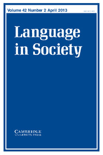
LANGUAGE IN SOCIETY
Unraveling the Ties Between Language and IdentityLANGUAGE IN SOCIETY, published by Cambridge University Press, is a leading interdisciplinary journal that explores the intricate relationship between language and social factors. With an impressive track record since its inception in 1972, this journal has become a critical resource for researchers and practitioners in the fields of linguistics, sociology, and political science, as evidenced by its high ranking in both the Q1 quartile and Scopus percentile rankings. In 2023, it was placed within the top 94th percentile among its peers in language and linguistics and the 93rd percentile in sociology. Furthermore, LANGUAGE IN SOCIETY provides an insightful platform for understanding language as both a social practice and a key element of identity and power dynamics. Although it does not currently offer Open Access options, its rigorous peer-reviewed content remains essential for advancing scholarship and informing professional practice in the study of language in diverse societal contexts. With its scholarly contributions, LANGUAGE IN SOCIETY continues to shape discourse and foster academic collaboration across disciplines.

Iberica
Championing excellence in language research since 1999.Iberica, an esteemed journal published by AELFE, serves as a vital platform for scholarly discourse in the fields of linguistics and language studies. With its inception as an Open Access publication in 1999, Iberica has democratized access to high-quality research, fostering an environment of collaboration and innovation among researchers and professionals alike. Based in Spain at UNIV JAUME I, the journal has witnessed a remarkable ascent in the 2023 category quartiles, achieving a Q1 ranking in Linguistics and Language. Furthermore, its impressive Scopus rankings place it in the top 25% within both the Arts and Humanities and Social Sciences disciplines. Covering a diverse range of topics from theoretical linguistics to applied language studies, Iberica offers a compelling opportunity for academics seeking to contribute to and engage with contemporary issues in the linguistic landscape. As it converges in its publishing years from 2008 to 2024, it continues to set the standard for excellence within its field, making it an essential resource for students, researchers, and language professionals.
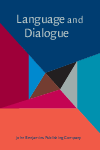
Language and Dialogue
Unveiling the Dynamics of Language and CommunicationLanguage and Dialogue is an esteemed journal published by JOHN BENJAMINS PUBLISHING CO, focusing on the interdisciplinary intersections of language use, cultural studies, and literary theory. With an ISSN of 2210-4119 and an E-ISSN of 2210-4127, the journal has established itself as a prominent platform for high-quality research since its inception in 2011. Notably, it is ranked Q1 in Cultural Studies and Literature and Literary Theory, reflecting its prestigious standing in these fields, and has impressive Scopus rankings that further underline its scholarly impact within the arts and humanities. Based in the Netherlands, Language and Dialogue is committed to advancing the understanding of dialogue's role in language and communication, providing a vital resource for researchers, professionals, and students alike. Although not an Open Access journal, it ensures access to cutting-edge research through institutional subscriptions, making it an essential addition to any academic collection in the humanities and social sciences.

DEUTSCHE SPRACHE
Exploring the Depths of German LinguisticsDEUTSCHE SPRACHE, published by Erich Schmidt Verlag, is a pivotal journal dedicated to the intricate study of the German language. With its ISSN 0340-9341 and E-ISSN 1866-5233, this publication serves as a vital resource for linguists, educators, and language enthusiasts alike. Spanning diverse topics within the fields of linguistics and language, psychology, and social sciences, the journal has earned a Q3 ranking in Linguistics and Language, alongside a Q4 ranking in both Psychology (miscellaneous) and Social Sciences (miscellaneous) as of 2023. Although the journal is not Open Access, it provides invaluable insights on the developments in German language research from its convergence years of 2002 to 2011 and 2017 to 2023. Positioned in Berlin-Tiergarten, Germany, DEUTSCHE SPRACHE continues to expand its influence and accessibility to researchers, professionals, and students keen on understanding the nuances of linguistic expression in the German language.
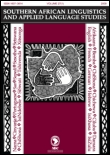
Southern African Linguistics and Applied Language Studies
Fostering Innovation in Language StudiesSouthern African Linguistics and Applied Language Studies is a prestigious journal dedicated to the exploration and analysis of linguistics and applied language studies within the Southern African context. Published by Taylor & Francis Ltd, this esteemed journal has established itself as a significant platform for scholars and practitioners since its inception in 2003. With an impressive Q2 ranking in the Linguistics and Language category and a current Scopus rank of #430 out of 1167, it occupies a vital position in the academic landscape, appealing to a diverse readership keen on linguistic research, language policy, and applied linguistics. While the journal is not currently open access, it provides comprehensive insights and scholarly articles that foster understanding and innovation in linguistic practices and language education. As of 2024, the journal continues to deepen its impact through rigorous peer-review and a commitment to advancing knowledge, making it a key resource for researchers, educators, and students seeking to navigate the complexities of language within the Southern African region and beyond.

Cultura Lenguaje y Representacion-Revista de Estudios Culturales de la Universitat Jaume I
Exploring the Intersections of Culture and LanguageCultura Lenguaje y Representacion - Revista de Estudios Culturales de la Universitat Jaume I is a premier open-access journal dedicated to the exploration of cultural studies, linguistic discourse, and literary theory, published by the esteemed Universitat Jaume I. Since its inception in 2004, the journal has consistently aimed to provide a vibrant platform for interdisciplinary research and critical reflection within the fields of communication, literature, and cultural representation. With its impressive rankings in the Scopus database—placing in the 93rd percentile for Literature and Literary Theory and the 73rd percentile for Cultural Studies—this journal is recognized for its impactful contributions to academic discussions. Operated out of Castelló de la Plana, Spain, the publication not only welcomes contributions from seasoned scholars but also encourages emerging researchers to submit innovative works. By maintaining a dedication to accessibility and quality, Cultura Lenguaje y Representacion positions itself as an essential resource for scholars, practitioners, and students seeking to deepen their understanding of the intricate relationship between culture, language, and representation.
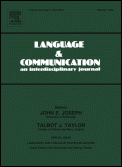
LANGUAGE & COMMUNICATION
Connecting minds through the study of language and communication.LANGUAGE & COMMUNICATION is a prestigious journal published by PERGAMON-ELSEVIER SCIENCE LTD that serves as an essential resource for researchers and practitioners in the fields of communication, linguistics, and psychology. With a focus on interdisciplinary approaches, this journal has maintained a strong impact, as evidenced by its high rankings—Q1 status in communication and linguistics, and notable categories in experimental and cognitive psychology, as highlighted by the 2023 Scopus rankings. Established in 1981, LANGUAGE & COMMUNICATION combines rigorous empirical research with practical applications, making it a critical forum for advancing understanding in language use and communication theory. While currently not an Open Access journal, it offers vital insights to academics and professionals alike, facilitating knowledge dissemination and sparking meaningful dialogue within the community. Its commitment to excellence is further demonstrated by its contributions to key areas of study, positioning it as a vital publication for anyone invested in the exploration of language and human interaction.
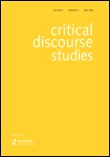
Critical Discourse Studies
Navigating the Intersection of Language and Social PracticeCritical Discourse Studies is a leading journal in the field of discourse analysis and communication, published by Routledge Journals, a prestigious imprint of Taylor & Francis Ltd. Established in 2005, it has garnered a significant reputation for its rigorous scholarly articles that explore the intricate relationships between language, power, and social practices. With an impressive Q1 classification in Social Sciences (miscellaneous) as of 2023, the journal serves as an essential platform for researchers, professionals, and students seeking to delve into critical perspectives on discourse analysis. Although not open access, its comprehensive peer-reviewed articles are instrumental in advancing understanding in areas such as sociolinguistics, cultural studies, and communication theory. Critical Discourse Studies thus stands as a vital resource for those engaged in the study of discourse and critical theory, consistently contributing to the dialogue on how language shapes and is shaped by societal structures.

IC-Revista Cientifica de Informacion y Comunicacion
Exploring the Intersection of Language and SocietyIC-Revista Cientifica de Informacion y Comunicacion, published by UNIV SEVILLA, EDITORIAL, stands at the forefront of academic discourse in the fields of Communication, Cultural Studies, Library and Information Sciences, and Linguistics and Language. With its ISSN 1696-2508 and E-ISSN 2173-1071, this esteemed journal showcases high-quality research, contributing significantly to the advancement of knowledge since its inception in 2016. The journal is recognized for its rigorous standards, holding a Q2 category in Communication, a Q1 category in Cultural Studies, as well as Q2 rankings in both Library and Information Sciences and Linguistics and Language as of 2023. With a growing reputation, it is ranked in the mid percentiles across various Scopus categories, marking it as a key player in its spheres of influence. Although not an open-access journal, it remains accessible through institutional subscriptions, making it a vital resource for scholars and practitioners alike. The editorial team is dedicated to fostering innovation and engagement within the academic community, aligning with the evolving dynamics of information and communication.
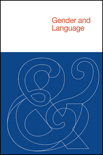
Gender and Language
Bridging Gender Studies and Linguistics for a Deeper UnderstandingGender and Language is a leading academic journal published by EQUINOX PUBLISHING LTD, focusing on the intersectionality of gender studies and linguistics. With an ISSN of 1747-6321 and an E-ISSN of 1747-633X, the journal has established itself as an essential resource for researchers and practitioners in the fields of gender, language, and philosophy, boasting impressive Scopus rankings, such as #62 in Philosophy and #139 in Language and Linguistics. Since its inception, it has significantly contributed to scholarly discourse on the dynamic interactions between gender and linguistic practices, aiming to promote a deeper understanding of how language shapes and reflects gender identities. With a current classification in the Q2 quartile in both Gender Studies and Linguistics, as well as a Q1 ranking in Philosophy, Gender and Language is a pivotal platform for innovative research and critical discussions. Based in the UK, this journal serves as a vital conduit for advancing knowledge in its domain, inviting contributions from scholars worldwide to explore the linguistic manifestations of gender in diverse contexts.